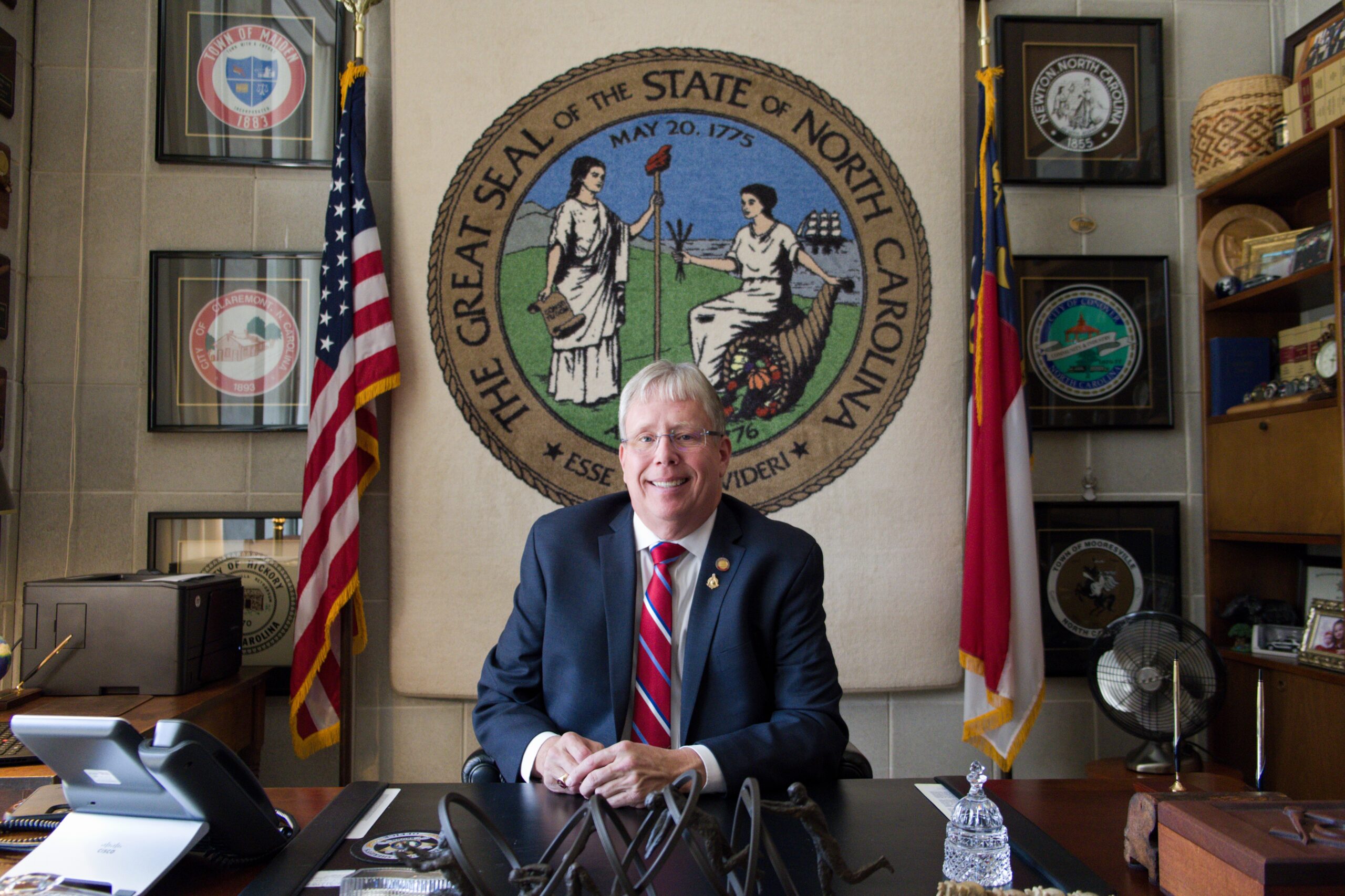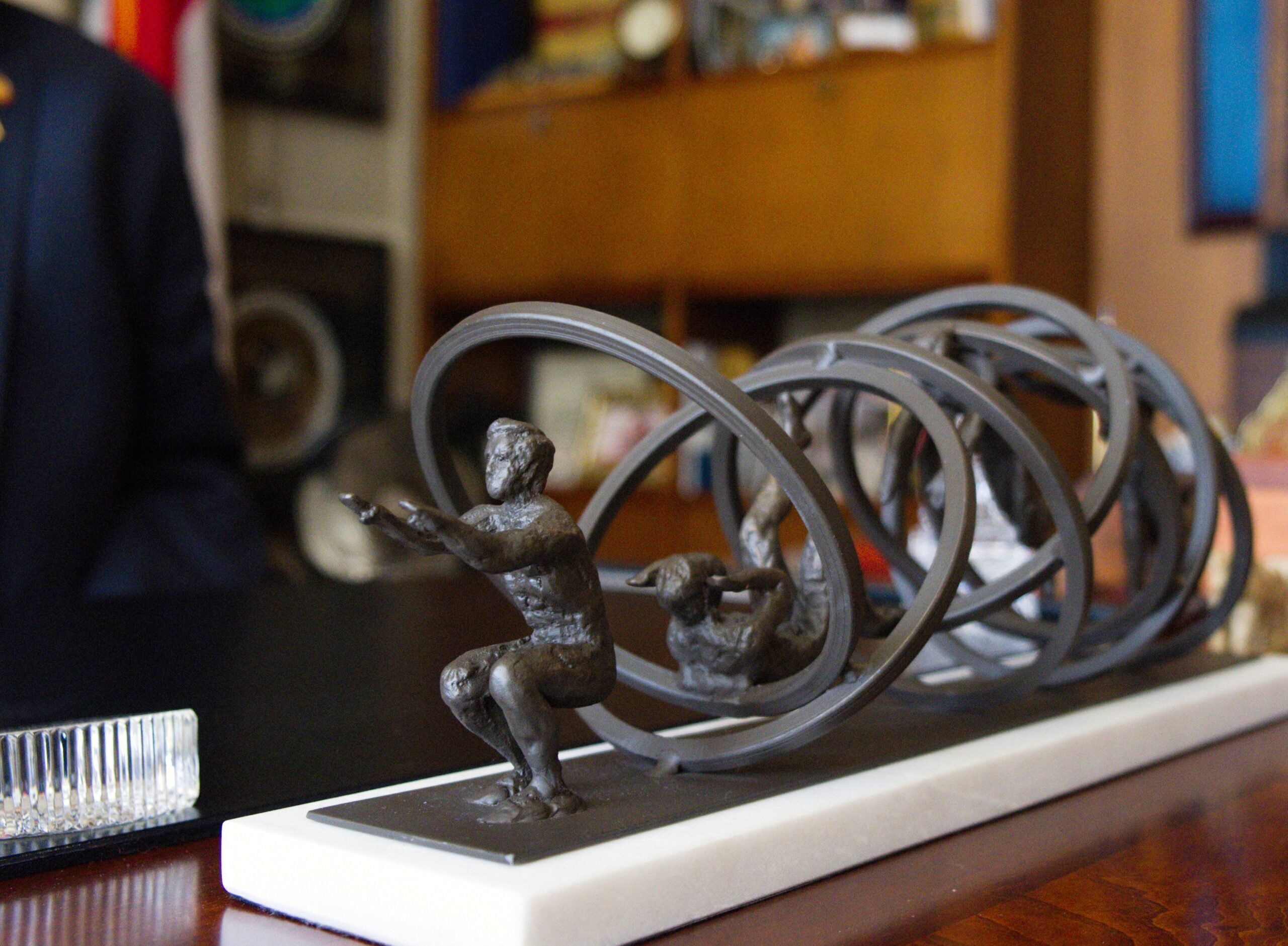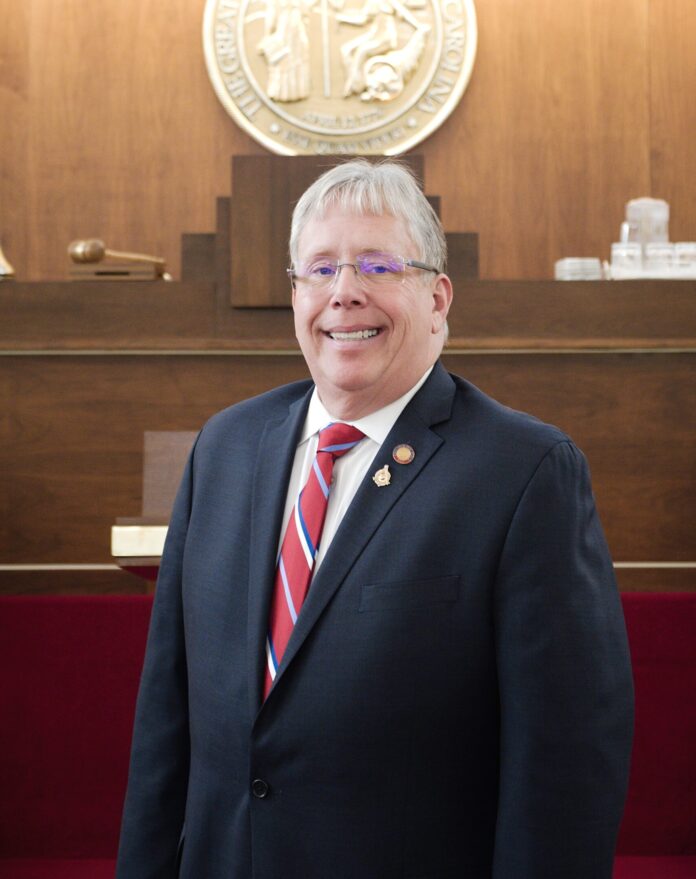Through 25 years of lawmaking, Rep. Setzer brings a rich history of local leadership to the General Assembly.
“I’m available. That’s the key function of being here. You’ve got to be accessible to people, and people have got to feel like they can call you. In the legislative office of Rep. Mitchell Setzer, front and center on his desk, is an iron ornament that depicts what it can at times be like to serve in public office—especially for those who’ve had as much longevity and variety in the government sphere as he has. It’s a series of hoops with anthropomorphic figurines jumping through them, the meaning pretty clear. “Sometimes you’ve got to jump through the hoops,” said Representative Setzer, who has served 12 going on 13 terms in the NC House, the second-longest tenure of anyone currently in the chamber. This is to say he’s familiar with the challenges of public decision-making. But he says he finds it all worthwhile for the chance to help North Carolinians, to be personally available not just to fellow elected officials, but also to everyday people from individual walks of life who have real-world needs.
For a man who also runs a family business back home in Catawba, 12 House terms and counting is a long commitment to service. But it didn’t start at the state level. Representative Setzer’s public leadership began in local government, where he served as a town board member and later mayor, helping to inform his style of service, accessibility to the people he represents, and understanding of the General Assembly’s diverse effects. Southern City recently visited Representative Setzer in his office to learn more.
˘˘˘
We’ve come off the 2022 legislative session and are gearing up for the 2023 legislature. What keeps you busy in the interim?
MS: My family owns a pipe company. We make storm drainage pipe. My grandfather started it, and that’s where I work in the real world. I go back to my real-world job once the Assembly adjourns. This particular interim—it’s more like it used to be when we had an interim. We haven’t had to come back for committees or for floor votes. So, this has been a pleasant return to having an interim between sessions.
You’ve served in the legislature a long time…
MS: 24 years. I start my 25th in January.
What initially interested you in lawmaking? Or any other public seat before you became a legislator?
MS: When I was growing up, my uncle was elected county commissioner in Catawba County. And that’s sort of how I became involved. The family was involved in politics at that point. Time passes, I graduate from college, I move into the town of Catawba. I was asked to serve on the planning board, and I accepted and was appointed. And then a gentleman was retiring that next November from the board and asked me to run for his seat.
On the town board…
MS: On the town council, yes. So, I ran and won a four-year term there. And then the mayor retired. I ran for mayor and won. I was in my second term as mayor when this seat opened up. And I remember reading in the newspaper that my predecessor, Robert Brawley, was retiring. And I remember being at my kitchen table reading that, and thinking I had a town board meeting to go to that night and didn’t think anything else of it. I really didn’t plan to be here, to be honest with you. I received a phone call from the sheriff at the time the next day, and a county commissioner. And I told both of them the same thing: I’m not using my municipal service as a stepping stone; I don’t have time to go to Raleigh. The next thing I know, I’m filing for office and getting ready to start my 25th year. It sort of seems surreal to think about it. It’s been a fast 24 years.
Were there any specific issues on your mind as you entered legislative office?
MS: I’m generally constituent-based. So, I don’t have a personal agenda. If issues come up that involve my constituents, then that becomes my direct interest. When I first became a member, there was an issue—a road at home in the old district (during an earlier iteration of the district’s lines), the 43rd House District, it’s called Brawley School Road, it’s a dead-end road, and it dead-ended down on a lake. I had a lady contact me, she wanted the road widened—it’s since been widened—and I said, “Well, ma’am, I’ve been in office two weeks. My predecessor was a Brawley, and he lives in Iredell County, and he’s been there 18 years. We don’t have jurisdiction over the roads.” But I’ve learned a lot and if it wasn’t for the opportunity to help people, I wouldn’t have run for a second term. But you can help people. You’re in a position that, at times, you can get people where they need to go. I enjoy that.
Are there issues that local governments, when they’re forming their legislative agendas or in conversation, tend to bring to you?
MS: The (NC Association of County Commissioners) forms a legislative agenda. The League does. You have those. And then more real-life is what the municipal entities need. I spend half my time down here at times trying to kill things that hurt the municipalities as opposed to help facilitate them along. We have a process for de-annexation and some people want to circumvent that. Even when people know they’re in the municipal limits when they bought the property, they still want to use us as a battering ram against the cities, and I don’t support that. You have to keep the cities vital. They have to be maintained as a vital entity. Because every one of them is an economic engine in the state. And if you destabilize one, there’s a domino effect that’s going to start. It’s interesting. You hear about anything from de-annexations to interbasin transfers, sub-basin transfers, all kinds of things that never came across the table when I was mayor of Catawba. But if it affects one city, it affects another. It can snowball. That’s why we have to be really careful about what we do here.
 In your time here in the legislature, have you seen changes in dynamics or trends?
In your time here in the legislature, have you seen changes in dynamics or trends?
MS: There’s one member here in the House now who was here when I came. That’s Representative (Julia) Howard, from Davie County, my seat-mate. Everybody behind us, they weren’t here when I came. It’s sort of like watching your family pass away, at times. We are a dysfunctional family. We call ourselves a family, but we are dysfunctional (laughter). It has evolved and hit changes and it’s different people in positions but it still operates the same way. The committees, the palace intrigue, as you might want to refer to it, the caucus, and things like that, you just never know what’s going to happen next. But the institution as a body, as an entity, has not changed. You have the balancing act between the chambers, regardless of which party has control. And that’s a good thing. I’ve said for years that the state’s safer when we adjourn (laughter) and away from this building. But, by and large, you have a lot of good people here and everyone means well in their own perspective… It’s just getting the votes. And that’s where it becomes tedious. You have the school calendar bill that passed at like 2 in the morning, when it passed years ago. I didn’t support it then. I think the local entities ought to be able to set their own calendar. We never can get enough steam in this institution to change that back. That’s something that’s always sitting out there… I was here when the lottery passed. That was palace intrigue… It’s never dull here. You can fight somebody like mad on one issue, and then find yourselves joining forces on the next. It ebbs and flows and generally people don’t take it personally. If they start taking it personally, it slows the whole process down, and it’ll drive this entity to a screeching halt. But sometimes that’s not a bad thing (laughter).
Anything that has surprised you during your service, or in the past few cycles?
MS: Around here, you can expect anything and not be surprised about it when you find problems in statutes—they look good when they’re written, but until something is written and enjoined into the statutes and ratified, when it gets working is when you’ll find some of the trouble… You will find flaws as things start working or as issues hit a constituent—that’s where you’ll find flaws in the statutes. They weren’t written by perfect people. They weren’t passed by perfect people. There are flaws there, but sometimes you don’t find them until they hit bone. Hindsight is 20/20—that’s a perfect analogy for here: hindsight is 20/20. And every session that ends, we always go back in the next session and fix something we’ve done. They call it unintended consequences. Once it all merges together, that’s when a flaw will come out. You can read it back and forward and sideways and never see it, until it actually (becomes law).
Do you find serving as a legislator is also a physical challenge?
MS: Those all-night sessions are hard. They’re hard on your body. There was a year—it was in ’01—when we were in session for 12 calendar months, and I felt like it took me two months to recover from that. Because we were steady in session. Twelve calendar months. That was hard on everybody: the members, the press, the public. And things are just moving along… It was a lot of struggle.
 How do you make that work, in terms of decompressing while you’re home?
How do you make that work, in terms of decompressing while you’re home?
MS: You don’t (laughter). You just roll with it. A lot of people have my cell number. I have it with me at all times if anyone needs me. It’s 828-999-0216. If anyone needs me, I’ve got my cell with me. My municipal entities—I’ve got a meeting with the Troutman town board in December. I talked to the town manager last week and I’m going to go to one of their meetings. Letting them know I’m available. That’s the key function of being here. You’ve got to be accessible to people, and people have got to feel like they can call you.
Do you have a good relationship and communication with your municipal leaders?
MS: I try to. I don’t bother them, and I truly don’t interfere. But if they need me, they know where I’m at. If they need me, I’ll do everything I can to help them. But I’m not going to micromanage them. I’ve sat behind that desk, and I know how hard that is, to sit behind that desk… There’s always equipment that has to be updated. The fire service, the maintenance. Big city, little city, the problems are the same, it’s just the massive scope. We were a town of 650 people, but it was good experience. Being chair of the board of the United Methodist Church was also good experience. And every now and again, you can help somebody. I enjoy that. My cities, my managers, mayors, boards, they all have my number. I try to be accessible. That lack of communication can have a snowball effect in a negative way, and you don’t want that… The cities are economic engines in their own right, and they have to be protected.
Do you find that your previous municipal experience has given you the right color to see how the legislature affects cities?
MS: Yes. I’m glad I had some local experience before I came down here. It’s hard enough to learn the rules and procedures as it is, but with being under a municipal entity, the formality is there, the structure. That was extremely helpful. I was thankful I had local experience. You don’t know exactly what to expect, but you have a blueprint in your mind as to how things may run. The concept is the same.












